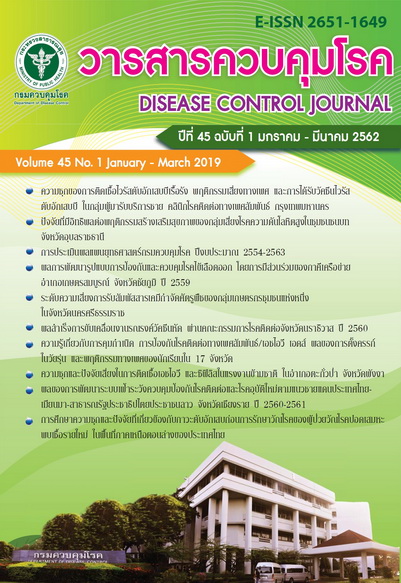Successful implementation of measles vaccination campaign by Narathiwat Provincial Communicable Disease Committee, 2017
DOI:
https://doi.org/10.14456/dcj.2019.16Keywords:
successful, Provincial Communicable Disease Committee, measles vaccination campaignAbstract
The aim of this study is to present an administration model of Provincial Communicable Disease Committee and study key factors contributing to success in public health breakthrough by the committee. The data for this qualitative research was gathered from document review, group discussions, and in-depth interviews. Forty (40) people were selectively chosen for inclusion into the study. The data was gathered from March through May 2018 and the conclusion was obtained by an inductive method. The success was analyzed using a modern management concept (known as POLC – which consists of planning, organizing, leading and controlling). In planning component, the Provincial Health Office (PHO) was applauded for its good problem analysis, identification of serious issues with high possibility of success, cooperation with promising partners, and development of solid strategies. In organizing component, the Provincial Communicable Disease Committee was found to have effective partners in the local administration organizations which could effectively reach out to local communities in distinct aspects from public health organizations. In leading component, both provincial governor and all district chiefs had excellent leadership, performing under the two main administrative acts, i.e. the State Administration Act and the Local Administration Act. Finally, in controlling component, it was found that close supervision by the leadership of local administration organizations was a primary strength. This was achieved by frequent meetings of the Provincial Communicable Disease Committee, weekly progress monitoring by district chiefs, and close collaboration with their teams to find solutions, utilizing a complex problem-solving principle, to address vaccine denial issues, such as concerns about children illness after vaccination, vaccination being against religious beliefs, and ignorance about the benefits of vaccination. During the campaign implementation period, which was ran from May through September 2017, progress from each district was presented in monthly meetings of local administration organizations, with awards given to excellent district chiefs, district health coordinating networks and primary care centers. Main factor leading to this achievement was excellent planning by the Provincial Communicable Disease Committee, resulting in members of the senior leadership paying attention to the matter and relevant policies being developed and implemented to assist with the work process especially in a district level. The campaign successfully helped increase MMR1 vaccine coverage in 1-year-old children from 58.97 to 91.1 percent, and helped expand MMR2 vaccine coverage in 3-year-old children from 60.17 to 86.44 percent. Overall, the local incidence rate of measles was greatly reduced. The key elements contributing to this success could be adapted and replicated in other areas with similar problems.
Downloads
References
2. Narathiwat Provincial Health Office. The summary of measles vaccination campaign inchildren aged 9 months to 5 years old was consecrated to to King Bhumibol Adulyadej Rama 9 as a royal charity, Narathiwat Province, 2017. Narathiwat: Narathiwat Provincial Health Office; 2017.
3. Srirapun N. Risk management on vaccination services in primary care units, Pattani Province. Al-NUR Journal of Graduate School, Fatoni University 2011;6:101-16.
4. Law Center, Department of Disease Control, Ministry of Public Health. Communicable
Disease Act B.E. 2558 (A.D. 2015). Bangkok: Chulalongkorn University Printing House; 2015.
5.Rattanasak, T. Thai Public Administration. Chiang Mai: School of Political Science Faculty of
Political Science and Public Administration, Chiang Mai University; 2012.
6. Jumpa M. Explanation of administrative law on government regulation and administration.
Bangkok: Chulalongkorn University Printing House; 2005.
7. Suntiwong T. Organization and management. Bangkok: Thai Watana Panich; 2000.
8. Satsue P. Effectiveness of immunization performance in children 0-5 years of subdistrict
health personnel Kanchanaburi Province [dissertation]. Bangkok: Mahidol University; 1999.
118 p.
Downloads
Published
How to Cite
Issue
Section
License
Articles published in the Disease Control Journal are considered as academic work, research or analysis of the personal opinion of the authors, not the opinion of the Thailand Department of Disease Control or editorial team. The authors must be responsible for their articles.






